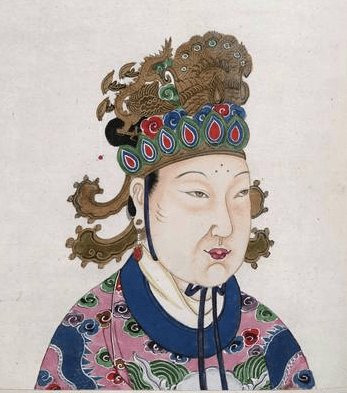The Empress Wang cooed over her stepdaughter. With no children of her own, she spoiled the child, only days old, and already loved her husband’s daughter like her own blood. She spent hours of the day in the child’s nursery. But she had duties to attend to. Bidding the girl and her nursemaid goodbye, the empress made her way out of the nursery. Moments later, the girl’s mother entered the room. Smiling down at the child, she smothered the helpless infant to death and exited the room, nodding at the maid. Later, she entered the nursery cheerfully with her lover, the Emperor and father of her children. They gazed into the child’s bassinet only to find the newborn blue and cold. The Emperor quickly turned to the nurse, demanding who had come to visit his daughter. Upon the answer that Empress Wang was the visitor, the emperor stormed out of the room, accusations of jealousy and murder already on his tongue. His lover smiled. This was the last straw. Empress Wang would be put aside. Wu Zhou, beloved mistress, mother, and favorite of the emperor, would take her place.1 “Well-behaved women seldom make history.”2
It is unbelievable that any woman would go so far as to murder her own child to seize power. Wu Zhou was relentless in ambition to rule. She began as a lesser member of the Inner Court of Emperor Taizong, where she met and fell in love with the Crown Prince Gaozong.3
It had been a year since his father’s passing and the young Emperor Gaozong still felt the grief in his heart, mourning for his father and mentor. As he approached the Buddhist monastery to pay his respects, a beautiful, familiar face caught his eye. The young nun was Wu Zhou, the maiden that had cared for him during his father’s illness. He pulled her into an embrace, happy to know that she was once again there to help ease him in his grief. He knew he was in love with her and he soon began making frequent trips to visit her in secret. His ever observant wife, Empress Wang, let him. In the eyes of the Empress, Wu Zhou was no threat to the crown.4
Emperor Gaozong brought his beloved to court as soon as custom dictated she was purified. In only a few years, she gave the emperor three sons and the daughter murdered in her bed, while the Empress remained barren. Empress Wang felt her connections to the nobles were no longer enough to hold Gaozong’s interest. As she struggled to maintain her power, Wu Zhou made powerful alliances with those underestimated by the powerful nobility, the harem, and servants closest to court action. These ladies, the nursemaid among them, became her closest allies and spies, allowing her to best her rivals time and again.5

Wu Zhou ascended the throne as Gaozong’s wife and Empress. She secured her place with four sons, each a viable heir to the throne. Her husband adored her. Behind the curtain that separated the outer court of men from the inner court of women, she learned the ways of the government. Under her husband’s watchful eye, she began to suggest political policies of her own. She convinced her husband to eliminate the nobles that supported the previous empress, consolidating her influence on the court. To replace them, the rulers established a policy where commoners were permitted to take civil examinations that would make them ministers, a role that beforehand was only filled by nobility.6 To the shock of the royal court, he allowed her participation in an ancient ceremony reserved for only the Emperor. They clearly operated as a team, calling themselves the “Two Sages.”7 This extended into the ailing final years of Gaozong’s reign, when the emperor proposed that Empress Wu rule in his stead during his prolonged illness. Outraged at the prospect of bringing a woman into the world of politics, the court rejected the proposal. Despite this, Empress Wu Zhou’s role in the Outer and Inner Courts had molded her into a shrewd, cunning, and outspoken political mind, surpassing her sons in experience and intellect.8
After the death of her husband, Dowager Empress Wu became regent for her son, Emperor Li Xian, before exiling and disposing of him only two months into his reign. She replaced him with Li Dan, her youngest and most obedient son, a “Momma’s boy.” With Li Dan as a figurehead, Dowager Empress Wu began to use her power honoring her ancestors, a traditional practice that emphasized filial duty and obedience. Through the elevation of her pedigree, Wu Zhou connected her lineage to the Zhou of antiquity, intent on creating her own dynasty.9
The ministers and nobility began to get extremely uncomfortable. They noticed how many of their colleagues that openly criticized the Dowager began to be appointed to stations far away from the capital. There were even tales of these minister encountering troubles in their travels, never arriving to their destination. They resented that this woman was essentially usurping their emperor. They feared the end of the Tang dynasty as more of the imperial Li family began to disappear to the various regions of the empire. So they began a plot to return the exiled Li Xian to the throne. The rebellion brought together the exiled supporters of the Li family, the sons of Gaozong. To the shock of the masterminds behind the plot, the common people did not care to rebel and the armies sided with the Empress. The rebellion was easily crushed.10
In the aftermath of this plot, masses of supporters gathered at the gates of the palace begging for the Dowager to become the Emperor. She refused. The next day the gates of the palace were again mobbed with supporters calling for Li Dan to abdicate in favor of his mother. But again, Wu Zhou refused to become Emperor. This continued for four days until finally, taking the show of popular support as a sign from Heaven itself, Wu Zhou crowned herself Emperor of China, founding a new Zhou dynasty.11
The most effective way Wu Zhao divided the loyalties of the elite under her was a bronze box for anonymous recommendations to the court. However, for fear of banishment or even death, it served to accuse other ministers of betraying the Emperor. Using the military to investigate these claims, most of the victims of these accusations were forced to commit suicide or were killed outright. Ruling with an uncompromising iron fist, no one dared to contest Emperor Wu Zhou’s authority aloud.12

Despite the chaos of a court divided, Wu Zhou proved her worthiness as a leader with the policy that as long as the working common people had their fill to eat, the state would remain strong. She supported farming specifically for the military, so the peasantry would not be forced to provide food for the army. Lastly, she implemented storehouses to be used in times of bad harvest or famine, which she had filled to capacity consistently. She supported many public works projects to improve her empire’s economy as well. She facilitated the rebuilding of canals and bridges to encourage trade and commerce. In addition, she funded the construction of improved irrigation systems across the empire.13
Throughout her reign, Wu Zhou was a great patron to the philosophies of Chinese culture. During her early time at court, Confucianism dominated the cultural practices of the elite. They had strict beliefs on gender roles. Under the codes of yin and yang, women were seen as personal and submissive with softness and gentleness, with no right to rule an empire. Men were seen to be public and dominant, displaying a firm and strong personality.14 Wu Zhou defied these traditional roles, so she was forced to legitimize her rule by alternate means. She proved faithful to tradition by displaying herself as the perfect daughter during her schemes to make her family worthy of a dynasty. She had the symbols of her name changed to include the symbols of the sun, representing yang, and moon, for yin. These were only a few of the traditions she employed to secure the throne.15
To soften the criticism she faced, Wu Zhou became a great proponent of Buddhism. She expanded the monasteries into great monuments and facilitated the building of new places of worship. She venerated Buddhist relics and elevated the religion over Daoism during her reign. A Buddhist prophecy had predicted that a female ruler and bodhisattva, an enlightened thinker, would come to rule over the empire. By linking Buddhism to her reign, Wu Zhou implied that she was this great saint sent to emulate the Buddha.16 However, in her old age Wu Zhou began to practice Daoism in an attempt to maintain her control as she became weaker and more feeble. She searched for the elixir of immortality, clinging to her position of power and wealth. She began showing disregard for the morality of court, inviting attractive young men to keep her company, stealing their youth to invigorate her and allowing her to remain on the throne.17

Wu Zhou is known among Confucian scholars for her reputation of ruthlessness and immorality. She was known to have had several affairs, especially in her old age, the stories of her undeniable and serene beauty followed her into her nineties. This sexual promiscuity was to the nobles’ greatest displeasure and they were sure to use this to slander her name. Her display of sexuality was so infamous, a novella was written about her indiscretion during the Ming dynasty a thousand years later.18 This was only one example of the slander of her name by Confucianists of her time. This continued well after her death, making it hard to tell what was truth and what was fiction. For example, there is no record of the murder of the newborn princess that aided Empress Wu in gaining the throne, only that her predecessor could not provide an heir. Every detail throughout Wu Zhou’s reign was carefully examined. All wrongs, whether it be rebellion or natural disaster, was a sign that the Emperor had lost the mandate of Heaven.19
Wu Zhou was a woman of extraordinary power, who forced the Chinese empire to kneel before her. She is the exception to the rule that women are not of the right constitution to rule. Her ways were wicked and cruel, a product of her gender and the traditions of her people. Ultimately, her intelligence, cunning, and tact in court made her an undeniably remarkable ruler in Chinese history.
- N. Harry Rothschild, Wu Zhao: China’s Only Woman Emperor (New York: Pearson Education, 2008), 31-32. ↵
- Laurel Thatcher Ulrich. ↵
- N. Harry Rothschild, Wu Zhao: China’s Only Woman Emperor (New York: Pearson Education, 2008), 27-28. ↵
- N. Harry Rothschild, Wu Zhao: China’s Only Woman Emperor (New York: Pearson Education, 2008), 29. ↵
- N. Harry Rothschild, Wu Zhao: China’s Only Woman Emperor (New York: Pearson Education, 2008), 29-35. ↵
- N. Harry Rothschild, Wu Zhao: China’s Only Woman Emperor (New York: Pearson Education, 2008), 37-48. ↵
- N. Harry Rothschild, Wu Zhao: China’s Only Woman Emperor (New York: Pearson Education, 2008), 49-64. ↵
- Women in World History: A Biographical Encyclopedia, 2002, s.v. “Wu Zetian,” by Jennifer W. Jay. ↵
- N. Harry Rothschild, Wu Zhao: China’s Only Woman Emperor (New York: Pearson Education, 2008), 82-89. ↵
- Encyclopedia of World Biography, 2004, s.v. “Wu Chao” by Paula K. Bryers and Suzanne Michele Bourgoin. ↵
- N. Harry Rothschild, Wu Zhao: China’s Only Woman Emperor (New York: Pearson Education, 2008), 157-158. ↵
- N. Harry Rothschild, Wu Zhao: China’s Only Woman Emperor (New York: Pearson Education, 2008), 125-136. ↵
- N. Harry Rothschild, Wu Zhao: China’s Only Woman Emperor (New York: Pearson Education, 2008), 172-173. ↵
- Xianlin Song, “Re-gendering Chinese History: Zhao Mai’s Emperor Wu Zetian,” East Asia: An International Quarterly 27, no. 4 (December 2010): 365. ↵
- N. Harry Rothschild, Wu Zhao: China’s Only Woman Emperor (New York: Pearson Education, 2008), 120-124. ↵
- N. Harry Rothschild, Wu Zhao: China’s Only Woman Emperor (New York: Pearson Education, 2008), 137-156. ↵
- N. Harry Rothschild, Wu Zhao: China’s Only Woman Emperor (New York: Pearson Education, 2008), 181-204. ↵
- Women in World History: A Biographical Encyclopedia, 2002, s.v. “Wu Zetian,” by Jennifer W. Jay. ↵
- Xianlin Song, “Re-gendering Chinese History: Zhao Mai’s Emperor Wu Zetian,” East Asia: An International Quarterly 27, no. 4 (December 2010): 367, 372. ↵



55 comments
Hannah Wilson
Although she obviously was not fit to be a mother, because she murdered and exiled her own children, she was fit to be the leader of China. It is disturbing that someone so deceitful could rise to power with the full support of the people. She appeared to be an exceptional leader, but behind clothes doors she was ruthless to all those who opposed her. Great Article. It was very interesting,
Destiny Leonard
This was such an interesting article to read, I cant believe all of the things she did in order to maintain her status and power. It is crazy to think that this woman actually killed her own child in order to grow in status. The thought of killing a baby to begin with is unimaginable to me let alone your own child. Its no wonder as to why she was viewed as wicked, cold blooded killing is not exactly something a protagonist is known for. In short the article was great, I look forward to reading more of your work. 😉
Miranda Alamilla
Wu Zhou was a questionable woman in authority. Although she wanted to show that she could rule despite being a woman, she handled it in some weird ways. She was very sneaky and gathered intel to impress and comfort her people; however, this could be seen as a strategic move on her part. But it really threw me off that she was able to kill her children. I understand that she is in power, but there is a distinct line between being powerful and being emotionless.
Anais Del Rio
Even though Wu Zhou came into power through seducing the emperor, she was able to prove that she could rule despite being a woman. By being close to the emperor and court she gathered intel that would later help her become popular. Maybe she was being humble when she refused to be emperor after the people were begging her, but once being on the throne she did not disappoint. Everything she did may have been to protect her image but it helped the people and made them happy.
Natalia Carroll-Long
This really upsets me. I really hate when people don’t understand how important children are. Why would she use her children to secure her power? I think this is how you know a person is cold and empty. It really enraged me that she killed two of her children without remorse. I understand that it is a struggle for women at this time to have power, but I just can’t get over what she had to do to get there.
Cristina Cabello
When anyone gets the opportunity to gain responsibility, they have a choice on how to obtain it. They can work hard for the role or simply play dirty. In this case, Wu Zhao murdered her own child in order for her to gain power. I can not believe that people can act this way. Especially when it ends up hutting someone else. But this article was written very well.
Elias Garza
Power has the ability to make people commit irrational actions. To have power means to have great respect from those around you. Wu Zhao sought to gain power a different way, through fear rather than respect. I respect that Zhao knew what she wanted and did what she could to achieve this goal, however I believe some people should recognize that some goals are not worth all the trouble, such as killing a child.
Anna Guaderrama
I remember originally hearing about Wu Zhao, but everything I was ever taught about her/ or managed to learned always seemed to show her in a negative light. For the most part, reading this article was very shocking to me and eye opening because of how ruthless she was and the extent she was comfortable with going to, for power. The idea of a mother killing her own child to me just seems so cruel.
Julian Aguero
Like many I am also conflicted to hear about Emperor Wu Zhao. It’s amazing what she did for the country and how she changed the stigma of women in power but killing your own child to show how far you will go attain power is quite unsettling. People must have been terrified to live under an Emperor who is so vicious. I can see how she was able to retain power since she was so supportive of the military. This definitely made Emperor Wu Zhao dominant over her empire.
Noah Laing
I’ve learned about the powerful Emperor Wu Zhao before, but she’s only been described to meet in a negative manner due to her harsh and unforgiving mentality. However, I was glad to read this very in depth article that helped explain some of her motives and the good she was able to bring the people she ruled over. Her tactics and methods still seem very cruel to me but I now see her reasoning for some of her actions.